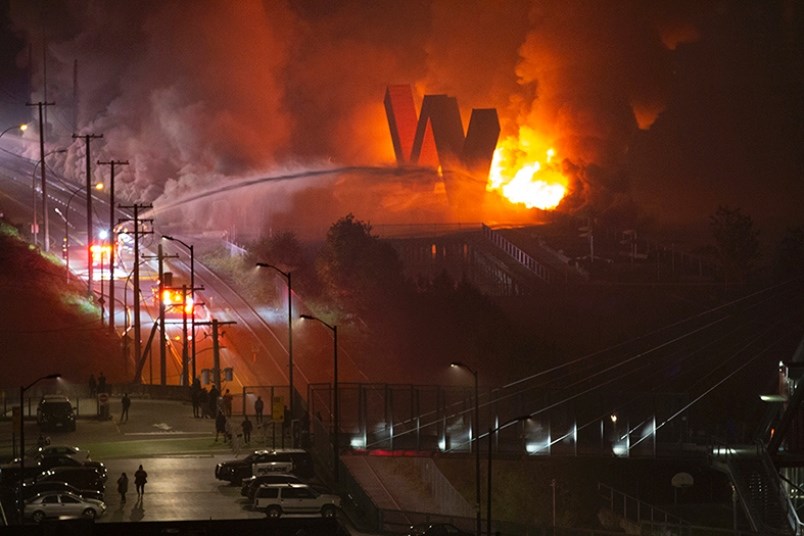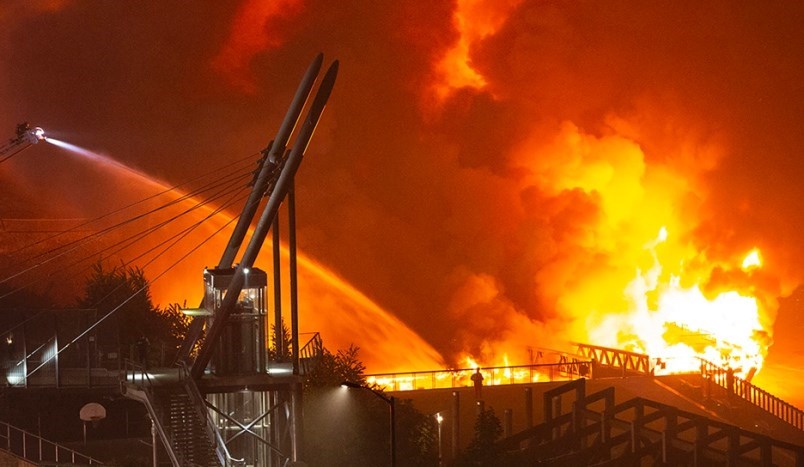Company behind New West pier fire fined

Numbered company 1141536 B.C. Ltd. was penalized for failing to address the long-term effects of a toxic spill connected to major fire that destroyed much of the New Westminster pier in 2020.
A B.C. numbered company whose property was involved in a large fire that engulfed a historic pier in New Westminster in 2020 has been penalized more than $33,000 for failing to properly respond to a long-term toxic spill.
Company 1141536 B.C. Ltd. owns three lots at 200 Front St. in New Westminster, B.C.. Five years ago, a major fire engulfed the pier in a conflagration that spanned the property and an adjacent lot owned by the city.
Debris from the fire — including creosote ties and asphalt material — entered the Fraser River, leading to a “spill” as defined by B.C.’s Environmental Management Act, according to a recent decision from director of the Environmental Management Act Jason Bourgeois.
The blaze was sparked Sept. 13, and quickly spread under the pier’s original 1957 wooden pilings, burning for days and destroying beach volleyball courts, hammocks, an urban beach and public art installation.
In June 2023, insurers provided the City of New Westminster with a final settlement offer of $30 million, which it accepted.

According to Bourgeois’s ruling, the numbered company was identified as a “responsible person” in the 2020 fire. Records list Devinder Grewal as the director as of Jan. 16, 2024.
Inspectors from the Ministry of the Environment and Parks visited the site in December 2024 and found evidence the company had breached the Environmental Management Act’s provisions around spill prevention. The inspectors recommended a $33,410 penalty.
Jatwinder Grewal contacted the ministry on May 8, 2025, to say the company was working with consultants to clean up and remediate the property. Jatwinder Grewal later submitted two reports to the ministry dated three and four years before the fire.
A 2016 report identified two nearby properties where there was “potential environmental concern” related to polycyclic aromatic hydrocarbons (PAHs) — one a former coal storage site and another the location of a marine towing company.

Another 2017 report showed almost all PAH concentrations on the company’s property did not meet detection limits before the fire.
Some kinds of PAHs are considered acutely toxic; others are carcinogenic and can impact species abundance, diversity and growth, according to the decision.
Bourgeois wrote there was no explanation how the two reports were relevant to the proposed penalties.
Company failed to respond to warnings, pay ministry debt
In March 2024, the ministry submitted the numbered company directions to demonstrate recovery and restoration of the environment in the area around the spill. But between Oct. 11, 2024, and Dec. 3, 2024, the company was found to have failed to identify and evaluate the long-term impacts of the spill.
That, wrote Bourgeois, “has created at least a risk of harm to the environment, including aquatic life in the Fraser River.”
The company had been issued four warnings in the five years leading up to the penalties. And in 2023, the ministry provided the company with a demand for just over $56,000 because it had taken initial steps to hire a contractor to assess the extent of the contamination. The company had yet to repay the debt, according to Bourgeois.
In coming to his decision, Bourgeois cited potential threats to an “abundance of life” in the Fraser River immediately downstream of the property. Some of the blue-listed species included bull trout, eulachon, brassy minnow and green sturgeon.
The director said that as a result of failing to clean up after the fire, the numbered company was creating the potential for adverse effects to the environment.
At the same time, Bourgeois said that the limited area of contamination and effective response by the city on its adjacent property means the effects could be mitigated within a “reasonable timeframe.”
The company has 30 days to appeal the decision.
With files from Theresa McManus




